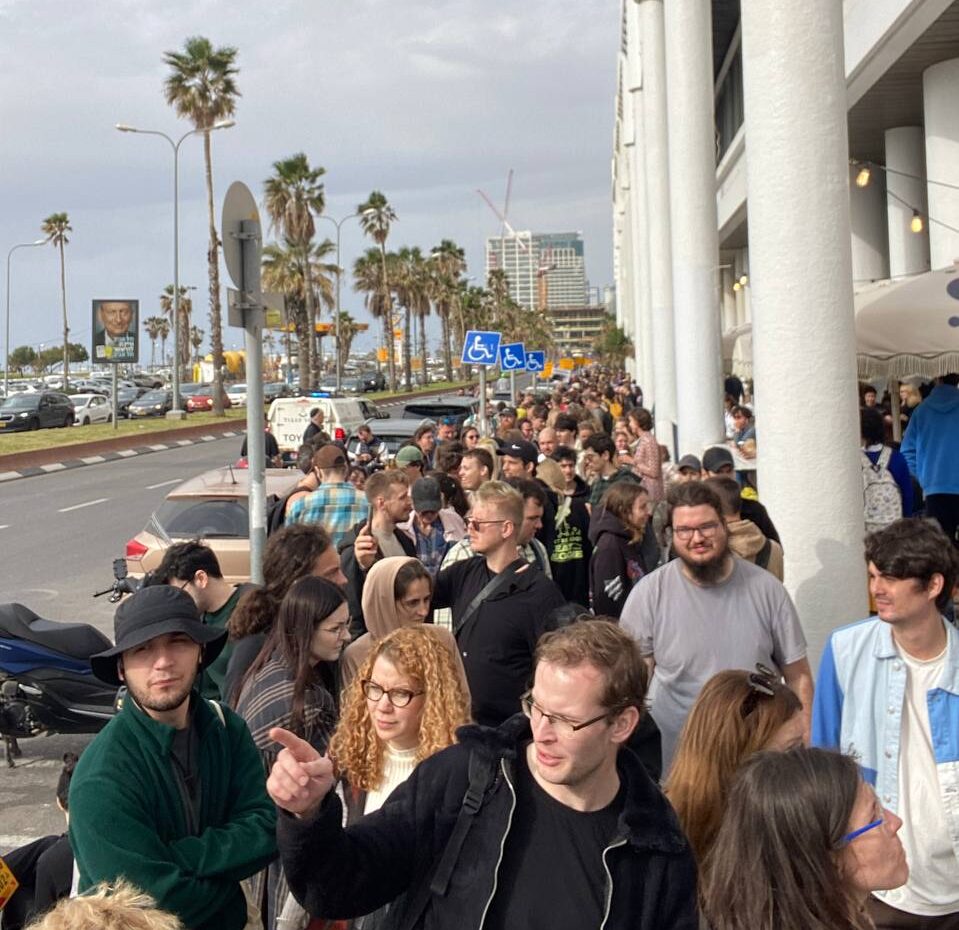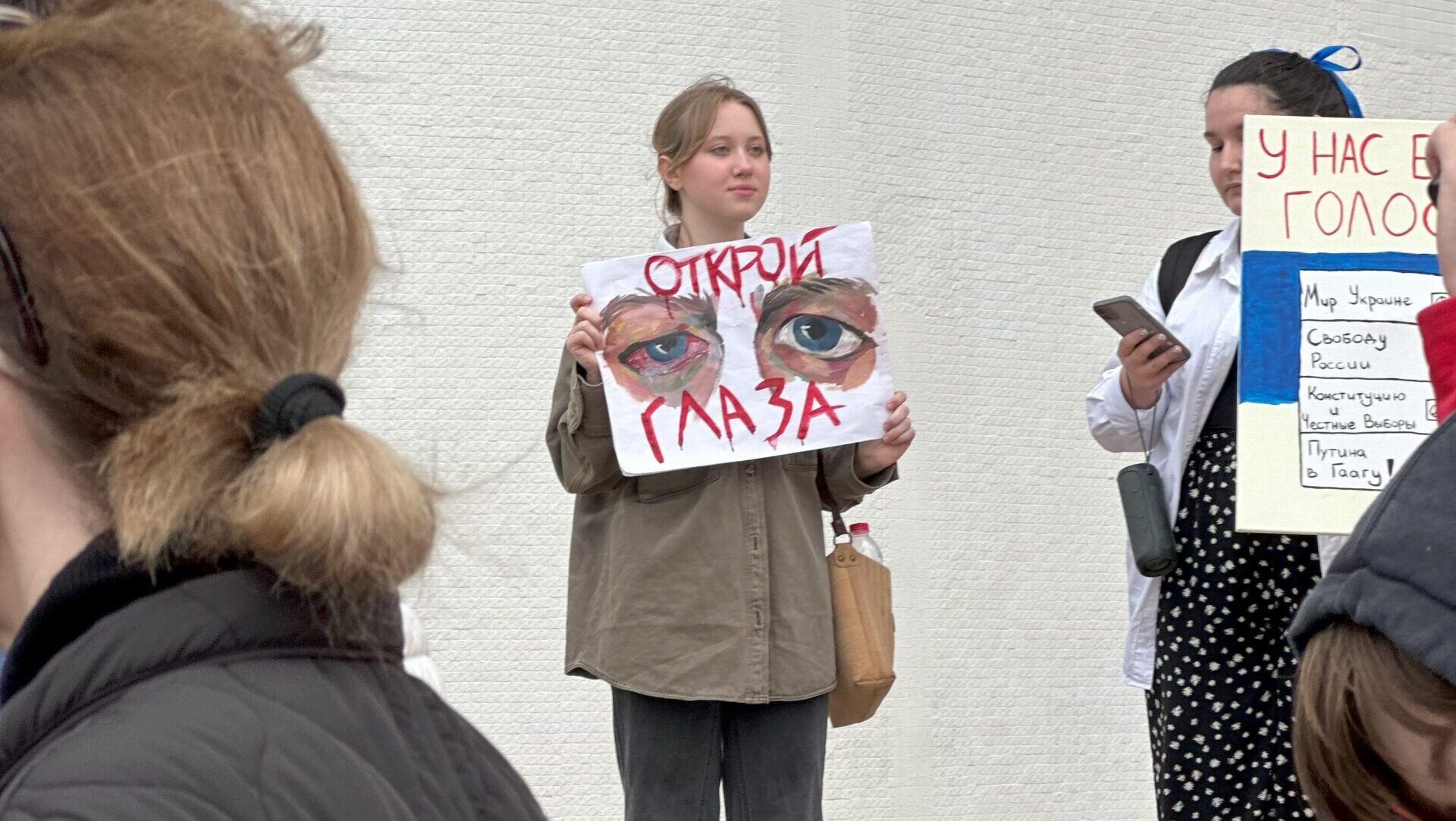Russian Elections: In Israel, UAE, Expats’ Loyalties Divided Between Putin and Opposition
Voters express fervent opposition to Putin amid long queues, heated exchanges, and diverse political sentiments in Middle Eastern polling stations
The presidential elections in Russia concluded on March 17 amid the ongoing conflict in Ukraine. Due to the war, a significant number of Russians were compelled to leave the country, with some resettling in the Middle East, primarily in Israel and the United Arab Emirates. Although the majority of voters expressed opposition to the war and the incumbent president, Vladimir Putin, some individuals still cast their ballots in his favor, sometimes aggressively demonstrating their position.
Esti, a Vote Abroad volunteer who moved to Israel after Russia invaded Ukraine in 2022, says she arrived at the polling station at 11 a.m. and left only at nightfall.
“The polling station was closed at about 9:45 pm, but after that, for about 40 minutes, people were still standing and shouting, asking to be allowed to vote,” she told The Media Line. “Then the police started to disperse people, and we left.”

Voters form a long line, waiting for their turn to vote, in Tel Aviv, Israel, March 17, 2024. (Courtesy)
These were elderly people who had been in Israel for many years; they all voted for Putin very sincerely and ardently
She told The Media Line that she felt many people voted for Putin. “These were elderly people who had been in Israel for many years; they all voted for Putin very sincerely and ardently.”
Esti noted that a few young people also voted for Putin, telling The Media Line, “There was a guy with military symbols—the letter Z on his T-shirt.” In the late afternoon, the crowd started shouting at people wearing symbols indicating they were for Putin. People shouted, “Shame on you!” and “Russia will be free!”
Esti, for her part, said she voted for Vladislav Andreyevich Davankov because “he is the only candidate who did speak out against the war, which is important to me.”
One voter, Kirill from Moscow, noted that he voted for Davankov—who has been described as “the most likely to become the alternative-to-Putin candidate”—because he was “the least disgusting” of all the candidates.
Others voted as a form of protest. A Moscow bar owner and entrepreneur who voted in Tel Aviv told The Media Line that they voted for Russian opposition activist Alexei Navalny, who died on February 19. He noted, “I spoiled the ballot because he is my candidate, and my enemies killed him.” Russian authorities cite the cause of Navalny’s death as “natural causes,” although his wife, Yulia, has noted, “We can’t really believe Putin and his government.”

A Russian presidential ballot with the name “Navalny” written on it, taken on March 17, 2024, in Tel Aviv, Israel. (Courtesy)
Some didn’t vote at all, including Ksenia, who is originally from St. Petersburg. She relocated to Israel in August 2023 and decided not to participate in this year’s elections, telling The Media Line, “Even though I’ve lived in Russia, I’ve never felt like I was Russian. I’ve known that I was Jewish for a long time and didn’t associate myself with Russia.”
“I never felt like it was my country in a sense of pride or belonging. Thus, I cannot say I need to participate in its life. But mostly, I don’t see that my vote will have an impact. I don’t believe it will make any difference. As sad as it sounds, I cannot say I feel hopeless, but it’s something close to this.”
Voters also expressed their anger that there were fewer polling stations this year than in the previous elections, telling The Media Line, “Not everyone who came was able to vote. There is a feeling that your right to vote is being infringed upon here because the polling stations’ capacity is minimal.”
A bar owner and entrepreneur from Moscow who came to Israel after Russia’s invasion of Ukraine told The Media Line that, despite standing for four and a half hours, he was “very happy to be in that line.”
“The fact that so many people who do not accept the current government have come and are ready to stand and wait for the opportunity to cast their vote, or rather not to give it to these bastards, is incredibly uplifting,” he said.
As for the results, a Vote Abroad survey found that, in polling stations across Israel, 45% of voters supported Davankov, and 17% supported Putin. Other voters gave their support to minor candidates Leonid Slutsky or Nikolay Kharitonov, spoiled their ballots, or refused to answer. The breakdown by city was 40% for Davankov and 16% for Putin in Jerusalem; 46% for Davankov and 16% for Putin in Tel Aviv; and 47% for Davankov, 19% for Putin in Haifa.
Anna and Misha from Moscow voted for Davankov. Misha told The Media Line, “I hope this will result in some kind of general act of solidarity.”
It is important that this is an anti-war candidate
“It is not very important what Davankov is like or what he will say next. It is important that this is an anti-war candidate,” he added.
Conversely, Anna from Moscow told The Media Line that her dad voted for Putin. She said, “This is a harrowing topic for me. Even ten years ago, he and my husband could discuss politics, but now my dad seems to be deceiving himself, speaking directly with some headlines.”
“When I asked him a question about why terrorists came to negotiations in Moscow, my dad said: ‘Well, of course, Russian politicians talked them into releasing the Israeli hostages.’ He cannot accept that the Russian elite does not consist of good people,” she told The Media Line.

People hold signs in Russian reading “Our choice is Navalny” and “Putin is a bastard” in Tel Aviv, Israel on March 17, 2024.
Angelina, a girl who voted for Putin in neighboring Dubai, disagrees, telling The Media Line, “I’ve been voting for him for years.”
Thanks to Russia and our president, I can live in any country and travel wherever I want. Therefore, my vote is for him.
“Russia has the best banking system in the world, the best education, the best restaurants, and the best service,” she said. “Thanks to Russia and our president, I can live in any country and travel wherever I want. Therefore, my vote is for him.”
Angelina said Dubai had a long line and an upbeat atmosphere despite the heat and scorching sun. She noted that these elections are more like support for her and a sign of the people’s unity because, in her opinion, it is already clear to everyone that Putin will win.
In her opinion, there is no Russian opposition in the Emirates, and if there is, “they are quiet and do not shine.”
Mikhail Zeldin-Gipsman, a specialist in crowd technologies and a doctoral student in political economics at Ariel University, an Israeli university in the West Bank, explained the contrast between the Middle East’s dissenters to The Media Line.
“In Israel, there is an electoral gap between the majority of Russians who previously voted, who made up no more than 10% of the Russians living in Israel, and the 60,000 Russians who have arrived in recent years. Some pensioners and Russian media consumers who support ‘Putin’s world’ previously ensured Putin’s victory.”
He explained that, according to the Central Election Commission, Putin won 48% (5,372 votes) in the 2012 elections, followed by Prokhorov in second place with 40% (4,477 votes). In 2018, Putin won 72.6% (12,007 votes).
“This year, there should be noticeably more voters in Israel for alternative candidates, especially for Davankov,” Zeldin-Gipsman told The Media Line.
He emphasized that the Russian authorities, with the outbreak of the war in Ukraine and after the terror of October 7, took an anti-Zionist and even antisemitic position, which is unlikely to add votes to the president among Russians in Israel who have one or two passports.
“The number of opposition-minded voters at the polling stations would have been greater, but the new war with Hamas and the risk of it escalating into a full-scale conflict became the reason for the relocation of many politically active migrants, especially with children, to other countries,” he added.
Zeldin-Gipsman told The Media Line that in the Arab Middle East, including the Palestinian Authority, but more so in Syria, Jordan, and other countries, the support for conservative, anti-globalist, or anti-American sentiment is much higher than in Israel. Additionally, the popularity of the “strong leader” that Putin frames himself to be is comparatively higher.
“There has been no mass migration to most Middle Eastern countries since the invasion of Ukraine began; movements are most often associated with “family reunion” or business cooperation,” Zeldin-Gipsman noted. “However, the second largest Russian diaspora is in Dubai. There is a conformist apoliticality among Russian businessmen, especially among those who maintain business ties with Russia. I wouldn’t believe in a high turnout in this region,” he added.
Zeldin-Gipsman emphasized that the Russian opposition does not have the tools and levers to change the results of these elections. He noted that, in his opinion, Russian media oppositionists consistently make an important strategic mistake. “In public actions and voiced positions, one can see the installation of a fence from the rest of the ‘united democrats’ in an undemocratic way.”
“From this, fences naturally arise between the supporters of democratic principles themselves,” he said. “They alienate the majority from themselves, regularly defining their existing audience of ‘supporters of liberal values’ as the only correct and prudent one.”

